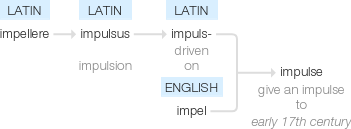Impulse
early 17th century (as a verb in the sense ‘give an impulse to’): the verb from Latin impuls- ‘driven on’, the noun from impulsus ‘impulsion’, both from the verb impellere (see impel).
wiktionary
Borrowed from Middle French impulser, from Latin impulsus.
For spelling, as in pulse, the -e (on -lse) is so the end is pronounced /ls/, rather than /lz/ as in pulls, and does not change the vowel (‘u’). Compare else, false, convulse.
etymonline
impulse (n.)
early 15c., "an act of impelling, a thrust, push," from Latin impulsus "a push against, pressure, shock," figuratively "incitement, instigation," past participle of impellere "to strike against, push against," from assimilated form of in- "into, in, on, upon" (from PIE root *en "in") + pellere "to push, drive" (from PIE root *pel- (5) "to thrust, strike, drive"). Meaning "a stimulus in the mind to action, arising from some state or feeling" is first recorded 1640s. As an adjective, in reference to purchases made on impulse, 1955 (in impulse buyer).
